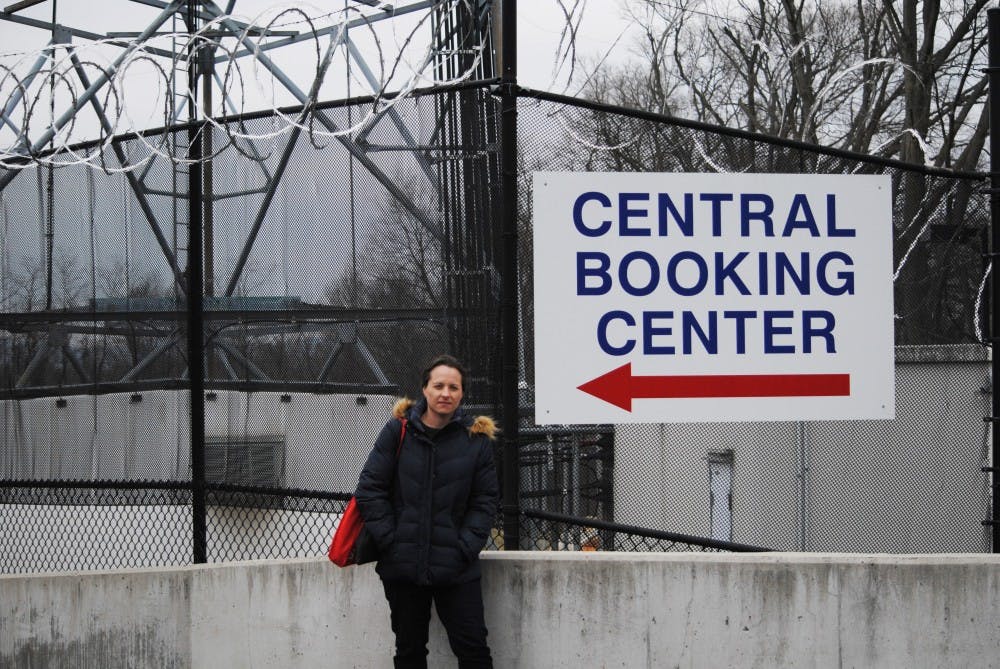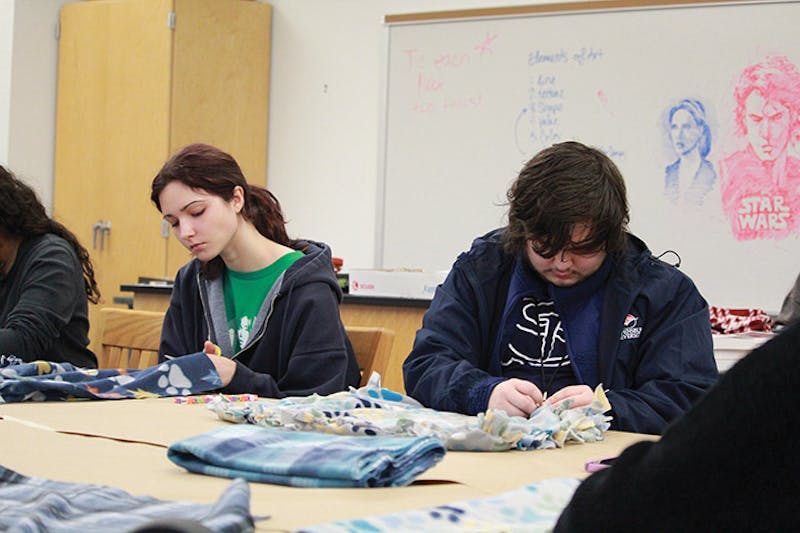The intercom system blared a scratchy voice that reverberated in the room, empty except for a table, chairs and the four women who sat there.
No one flinched from the intercom’s intrusion and they all went quiet to hear the set of orders. Even though only three of the women wore the maroon jumpsuits that marked inmates at the Cumberland County Prison, they all share similar experiences with drug and alcohol addictions, broken relationships and an attempt to find the path to healing through poetry.
For the past nine months, Nicole Santalucia, Shippensburg University professor and author of “Because I Did Not Die,” has been teaching an hour-long class several times a month. She brings paper, pencils, poems and her experiences with drug and alcohol addiction into the Cumberland County Prison. What she leaves behind, however, are her stories of addiction and the poetry that continues to help her process the past.
“Part of me looks at [the poetry sessions] as a way to be of service to people who need an outlet of expression,” Santalucia said. Previously, Santalucia has taught poetry to women in places such as The Boys & Girls Club and the Young Women’s Christian Association (YWCA).
The first woman to enter the prison room for poetry class bounced in and immediately scooped up three pencils that Santalucia had set on the table with some paper. As Santalucia had said a few seconds earlier, pencils are very popular and valuable in prison. The woman, Liz, jammed the three pencils in the breast pocket of her maroon uniform and set two sheets of crinkled notebook paper, which contained her poems, on the table.
When the loudspeaker announced that it was time for poetry, Liz said that she screamed and told everyone in her block that they should come for the session. She has had “March 4,” the date of the poetry class, on her calendar since February, Liz said with child-like eagerness.
Another two women — Julia and Chelsea — trickled in for poetry class, a small group compared to previous sessions, where Santalucia has had as many as 25 women come for poetry.
“I think some of [the women] are curious. Some of them are antsy and want to get out of their cell block. After building a rapport these past nine months, word has spread that’s it’s a cool place and a fun place and a safe place to go,” Santalucia said.
The class began with Liz reading the poems that she had written since the last poetry session. As she read verses that were the product of abuse and brokenness in her 26 years, her thin wrists and delicate features became more fragile and her purple-framed glasses seemed ill-fitting for a mother of three.
Sitting across from Liz was Julia, her face tired with several flashes of white poking through her brown hair pulled back in a bun. As she cried from Liz’s story and her own hardship, her eyes sharpened to a brighter blue because of the contrast from the fine ring of red that encircled her eyes.
“What I like about poetry is that it can sum up emotions and time and it has a healing process too,” Julia said. “I’m hoping through being sober it will arouse my creativity that I’ve somehow lost temporarily.”
It is through poetry, Julia said, that she is able to piece together parts of her past that have led to her addiction.
Julia and Chelsea also read their poems and, although each one talked about a different subject, they all carried the same theme of broken relationships. In the poems there was sadness, but there was humor too — expressed with full-blasted, open-mouthed laughter, it exploded just as easily as the tears.
“The hour we spend together is full of discovery and the willingness to change — it is an honor to witness their strength. Poetry is in the center of the room and the women courageously reach for it, shape it, speak it, feel it, listen to it, and own it.”
For Santalucia, their healing is also a way for her to never forget her experiences with active addiction.
From the time she was 12 or 13, Santalucia was in institutions or rehab centers. A month before she turned 21 she hit her darkest point and decided to enter into her fourth rehab for the first time of her own choice. Santalucia finished her final rehab a month before she graduated Binghamton University in 2002. After working two different corporation-type jobs, she earned her master’s degree in 2008 from the New School in New York and then her doctorate from Binghamton University.
She would not have overcome her past struggles, she said, had it not been for the people who offered help — help that she refused for many years because of her denial.
Now, Santalucia returns the favor. She helps these women in some of the simplest ways — by listening. She asked to hear poems repeated and said that they were great: “I love these [poems]. Hang on to them,” she told her three students after they had each read their work.
Santalucia hopes to publish their work in a small anthology and “to bring their voices literally outside of the bars and onto the pages that end up in people’s hands,” she said.
“I think [these women] need to know that somebody else cares outside of the world that they’re in,” Santalucia said. “I pay attention. I repeat what they say. I don’t hide my experiences from them. We talk about it openly.”
What is more, Santalucia said, is that she can “speak their language” and introduce them to a new language — the language of poetry.
“Every time you revisit the past through writing you’re remapping your brain through that experience,” Santalucia said.
When she writes about the past, it alters the memory so that she can see it from a different perspective and from that she develops a new relationship with her past. Indirectly, this is what she tries to teach the women in her poetry class.
“[Poetry] separates me and it also helps me to not forget. It clears out the cobwebs or baggage that I’ve been carrying around so that I can make room for new things because if I held on to all of that, I would be full. I wouldn’t have room for new things.”
Even though it is just an hour that Santalucia spends with these women a few times a month, something about poetry must be working for her prison students, too.
“I’ve seen [these women] take risks and break out of their comfort zones… We have this experience for an hour where they get to release their secrets. And in that way they’re opening the door for the possibility of healing,” Santalucia said.
Liz said that through reading and listening to other people’s poetry she can now open up about her past and her emotions by putting them on the page.
All three women — Liz, Julia and Chelsea — seem to have found a kind of strength from poetry simply in their ability to write it and read it.
“I want poetry to help me and other people with what happened to them,” Liz said. “This class helped me to learn that I do have a voice.”
The intercom system blared a command that would have been gibberish to an outsider, but it seemed to make sense to the women, who are conditioned to a walled-in life that does not seem to have doors. Chelsea, with a hole in her nose where a jewel or a hoop used to be, was the first to leave the poetry session.
“You can’t run away from it when it’s staring at you from a piece of paper. Poetry heals you,” Chelsea said, just before she left the room, a nesting place of poetry, tears, laughter, stories and healing.




The Slate welcomes thoughtful discussion on all of our stories, but please keep comments civil and on-topic. Read our full guidelines here.